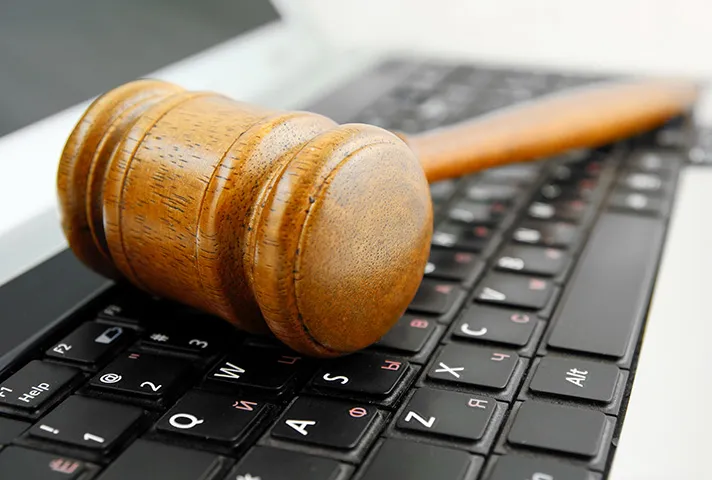
Credit: Shutterstock.
From home offices and kitchen tables, federal judges are foregoing their traditional courtroom settings to continue some of their courts’ vital operations virtually amid the coronavirus (COVID-19) outbreak.
“We have far too many cases to have operations come to a grinding halt,” said Clerk of Court Molly Dwyer, of the Ninth Circuit Court of Appeals. “Moving to remote video and audio conferencing is the best way to protect judges, employees, litigants, and the public, while also upholding our constitutional responsibilities.”
Federal circuit, district, and bankruptcy courts are utilizing multiple audio and video conferencing technologies to host oral arguments, initial appearances, preliminary hearings, arraignments, misdemeanor sentencings, and other procedures remotely. The many technology options being used and tested by the Judiciary include AT&T Conferencing, Court Call, Skype for Business, Cisco Jabber, and Zoom.
At the Bankruptcy Court for the Southern District of Texas, some complex cases involve more than 100 attorneys. The court is keeping those cases moving remotely with video conferencing.
“These tools are absolutely lifesaving,” said David Bradley, clerk of court for both the district and bankruptcy courts in Southern Texas. “Judges need to be available to grant people relief and ensure that litigants can meet statutory deadlines in the U.S. Bankruptcy Code. Our litigants have been very receptive to the changes we’ve had to make, understanding that it’s really the only way to ensure that cases can continue safely.”
Holding remote court proceedings at a detention center is a complicated effort that requires a great deal of coordination. Finding suitable space for a call, testing the technology, ensuring all evidence is submitted by email, and assigning an interpreter are just some of the matters that must be resolved before a teleconference is held.
In Rhode Island, proceedings can take quite a bit longer if an interpreter is needed. With only one conference line currently at the detention center, an interpreter can’t translate the defendant’s words simultaneously for the judge.
“While the technology isn’t a perfect replacement for physical face-to-face interactions, it allows our court to maintain stability in a time of instability,” said Clerk of Court Hanorah Tyer-Witek, of the District of Rhode Island, whose court made the switch to telephonic proceedings as it works with the local detention center to set up video conferencing.
As courts shut physical doors and open virtual ones, they’re working to make proceedings accessible to the media and public. Some court units are providing call-in and video conferencing links from their websites and others are asking that the media and other third parties call the clerk of court’s office for the information.
“It’s important that we maintain public access in these uncertain times,” Tyer-Witek said. “We’ve set up a separate muted conference line for our proceedings, so we can have the media and public listen in without fear of affecting the interactions between judges and litigants.”
The Judiciary is continuously evaluating the procedures and services being used to keep the wheels of justice turning as COVID-19 cases climb.
The Judicial Conference, the national policy-making body for the federal courts, issued guidance in late March that provided for media and public teleconference access to federal civil court proceedings. After Congress passed the Coronavirus Aid, Relief, and Economic Security Act (CARES Act), new guidance was issued that provided for media and public access to electronic criminal proceedings, including arraignments, detention hearings, supervised release revocation hearings, and misdemeanor pleas and sentencings. Most jury trials have been postponed for the duration of the crisis.
“We’re building the bike as we ride it and we’re going to do everything in our power to make sure that it doesn’t break,” Dwyer said. “No remote solution is going to be without its flaws, but we’re going to keep doing our absolute best to be there for our litigants and the public, while at the same time being mindful of the needs of our judges and employees.”
Federal courts are regularly coordinating with state and local health officials to obtain local information about COVID-19, and issuing orders relating to court business, operating status, and public and employee safety.
Subscribe to News Updates
Subscribe to be notified when the news section is updated.
